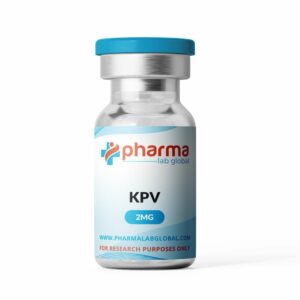KPV Peptide Vial UK


At Pharma Lab Global, KPV peptide, a potent anti-inflammatory compound, is composed of three amino acids: lysine (K), proline (P), and valine (V). This tripeptide has shown considerable promise in managing various inflammatory conditions, particularly inflammatory bowel disease (IBD). Research highlights KPV’s ability to mitigate inflammation in colonic cells, suggesting potential therapeutic benefits for reducing inflammation and boosting immune modulation.
Alpha-MSH derivatives, including KPV, have also been linked to enhanced wound healing, reduced infection risks, and improved cosmetic outcomes. Studies show that KPV and similar peptides could become key players in reducing scars after surgery. In fact, How KPV Peptide Accelerates Wound Healing and Reduces Scarring is a crucial area of research for the future of post-surgical care.
KPV is a fragment of the alpha-melanocyte-stimulating hormone (alpha-MSH). Various short derivatives of alpha-MSH have been studied for their effects, including their potential to combat ischemia, regulate sexual function, offer photoprotection, and improve energy homeostasis, among other benefits.
The combination of lysine, proline, and valine in KPV gives it remarkable anti-inflammatory properties. Research continues to explore its role in managing inflammatory bowel disease. Additionally, studies suggest that KPV’s anti-inflammatory effects extend beyond the intestines, benefiting the gastrointestinal tract, central nervous system, vascular system, lungs, and joints.
Sequence: Lys-Pro-Val
Molecular Formula: C16H25N4O4
Molecular Weight: 342.43 g/mol
Size: 2mg
KPV is especially significant in reducing intestinal inflammation. In mouse models of inflammatory bowel disease (IBD), KPV decreased inflammatory cell infiltration, reduced myeloperoxidase (MPO) activity, and improved histological signs of inflammation. Mice treated with this peptide showed enhanced recovery rates and increased body weight. Notably, the peptide’s delivery system—using nanoparticles functionalized with hyaluronic acid—ensures targeted action, directing KPV to the specific sites in the intestines where it’s needed most. This approach aids in the inhibition of TNF-alpha, reduces inflammation, and promotes the healing of the intestinal mucosa.
Further studies reveal that KPV inhibits key signaling pathways involved in inflammation, such as NF-kappaB and MAPK. This inhibition results in a reduction of inflammatory changes in the intestines. In fact, mouse models treated with KPV displayed shorter colons and less colonic infiltration compared to untreated controls.
UK clinical studies using animal models have confirmed KPV’s anti-inflammatory effects, which occur without the pigmentation typically associated with scarring. In addition to its anti-inflammatory benefits, KPV also demonstrates antimicrobial properties, helping prevent infections like Candida albicans and Staphylococcus aureus. This is particularly advantageous for wounds, including burns, as KPV prevents infection without compromising the body’s ability to fight other pathogens—something other anti-inflammatory drugs often struggle with.
KPV’s role in reducing chronic inflammation makes it particularly useful for preventing hypertrophic scarring (such as keloids). This type of scarring results from excessive macrophage infiltration, TNF immunoreactivity, and high neutrophil levels. Alpha-MSH peptides, like KPV, promote improved wound healing and reduced scarring severity. Interestingly, these peptides could also offer a novel solution for minimizing scarring caused by chemotherapy treatments. This application could allow patients to receive higher doses of chemotherapy drugs for better results, without the added risk of severe scarring.
Although research in the UK is ongoing, KPV peptide has already shown promising results in reducing infection, combating inflammation in the intestines, and offering potential relief for individuals suffering from IBD. It has also demonstrated significant promise in accelerating wound healing and preventing hypertrophic scars without causing skin pigmentation, offering better cosmetic outcomes. The continued study of KPV could reshape the way we approach both inflammatory conditions and post-surgical recovery.